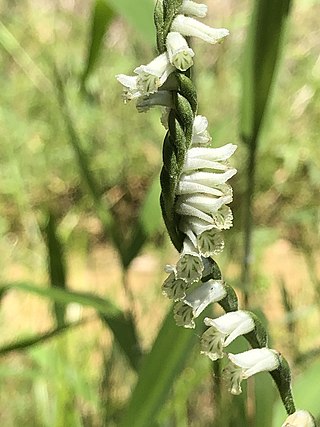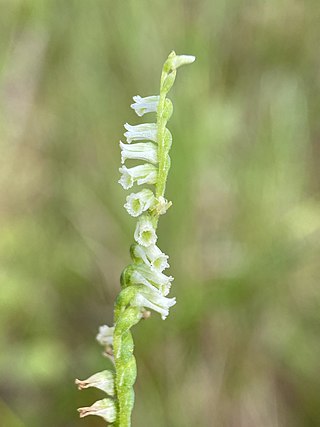
Spiranthes is a genus of orchids in the subfamily Orchidoideae. They are known commonly as ladies tresses, ladies'-tresses, or lady's tresses. The genus is distributed in the Americas, Eurasia, and Australia. The genus name Spiranthes is derived from the Greek speira ("coil") and anthos ("flower"), and was inspired by the spirally arranged inflorescence.

Spiranthes romanzoffiana, commonly known as hooded lady's tresses or Irish lady's-tresses, is a species of orchid. Collected by Chamisso during the Romanzov expedition it was described by him in 1828 and named for Count Nikolay Rumyantsev who financed the expedition. This orchid is native to North America, Ireland and the British Isles.
Spiranthes parksii, the Navasota ladies' tresses, is a species of orchid that is endemic to Texas, United States. The flower was first discovered in 1945 and was first described by Donovan Stewart Correll in his 1950 book, Native Orchids of North America North of Mexico.

Spiranthes cernua, commonly called nodding lady's tresses, or nodding ladies' tresses, is a species of orchid occurring from Maritime Canada to the eastern and southern United States. As the common name suggests cernua means "nodding", or "bowed" in Latin.

Spiranthes delitescens is a rare species of orchid known by the common names reclusive lady's tresses, Canelo Hills lady's tresses, and Madrean lady's tresses. It is native to Arizona in the United States, where there are only four occurrences. It is threatened by the loss and degradation of its habitat. It is a federally listed endangered species of the United States.

Spiranthes ovalis, commonly called the October lady's tresses, is a species of orchid that is native to eastern North America.

Spiranthes australis, commonly known as austral ladies tresses, is a species of orchid that grows from southern Caspian Sea and Himalayan Mountains to the South-West Pacific and north throughout Japan. It has up to about ten leaves at the base of a flowering stem with up to sixty small pink and white flowers spirally arranged around it.

Spiranthes tuberosa, commonly called little lady's tresses, little pearl-twist and slender ladies'-tresses is an orchid species. It is a perennial plant native to North America.

Spiranthes lucida, the shining ladies'-tresses, is a species of orchid native to northeastern North America.

Spiranthes arcisepala, the Appalachian ladies' tresses, is a species of flowering plant in the family Orchidaceae. This orchid is native to eastern North America. Long treated as part of Spiranthes cernua the species complex was reevaluated and Spiranthes arcisepala established as a separate species in 2017.

Spiranthes torta, the Southern ladies’ tresses, is a terrestrial orchid native to Florida, Mexico, Central America, the Caribbean Islands and Bermuda.

Spiranthes brevilabris, the short lipped ladies' tresses or Texas lady's tresses is a rare and endangered orchid native to the southeastern United States.

Spiranthes longilabris, the long lipped ladies' tresses is an orchid endemic to the southeastern United States.

Spiranthes praecox, the grass leaved ladies' tresses, green-vein ladies'-tresses or sometimes giant ladies' tresses is a terrestrial orchid endemic to the United States, growing on the eastern coastal plains and around the Gulf Coast.

Spiranthes sylvatica, the woodland ladies' tresses or pale-green ladies'-tresses is a terrestrial orchid endemic to the United States, very similar in appearance and range to Spiranthes praecox which it had been considered a variation of for a long time.

Spiranthes eatonii, commonly known as Eaton's ladies' tresses is a terrestrial orchid endemic to the United States, closely related to or a variation of Spiranthes lacera.

Spiranthes laciniata, the lacelip ladies' tresses is a terrestrial orchid endemic to the south eastern United States.

Spiranthes bightensis, the Atlantic ladies tresses, is a terrestrial orchid native to coasts of the north-eastern United States.

Spiranthes casei, or Case's lady's tresses, is a species of orchid native to the northeastern United States and Canada.

Spiranthes sheviakii, the old field ladies' tresses, is a species of orchid growing in North America.




















